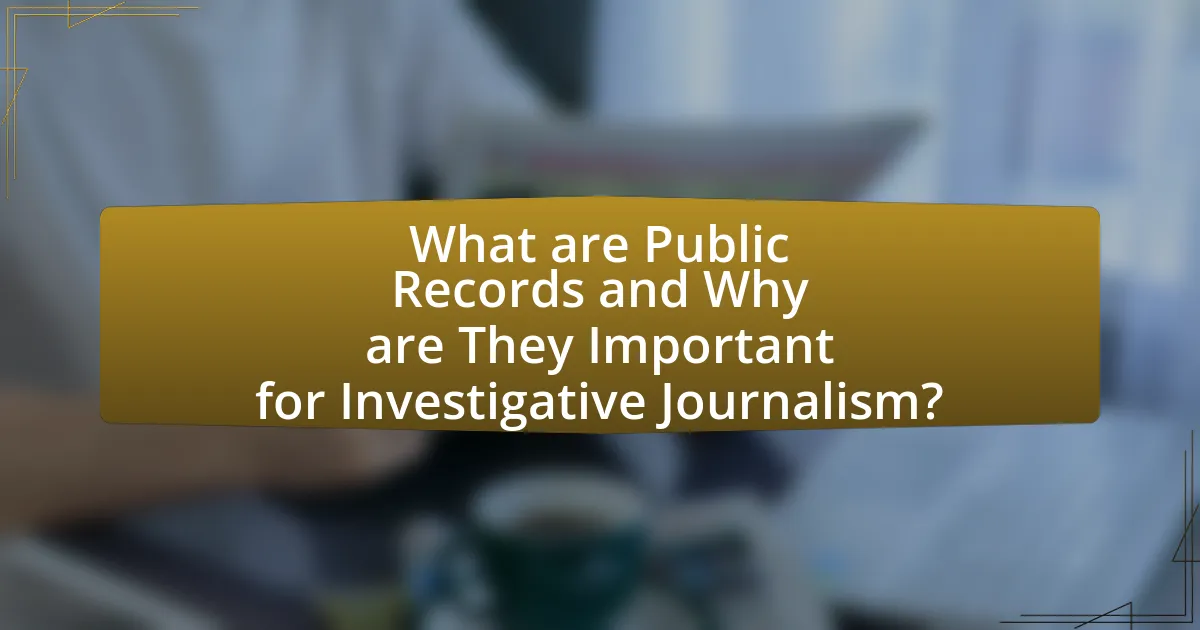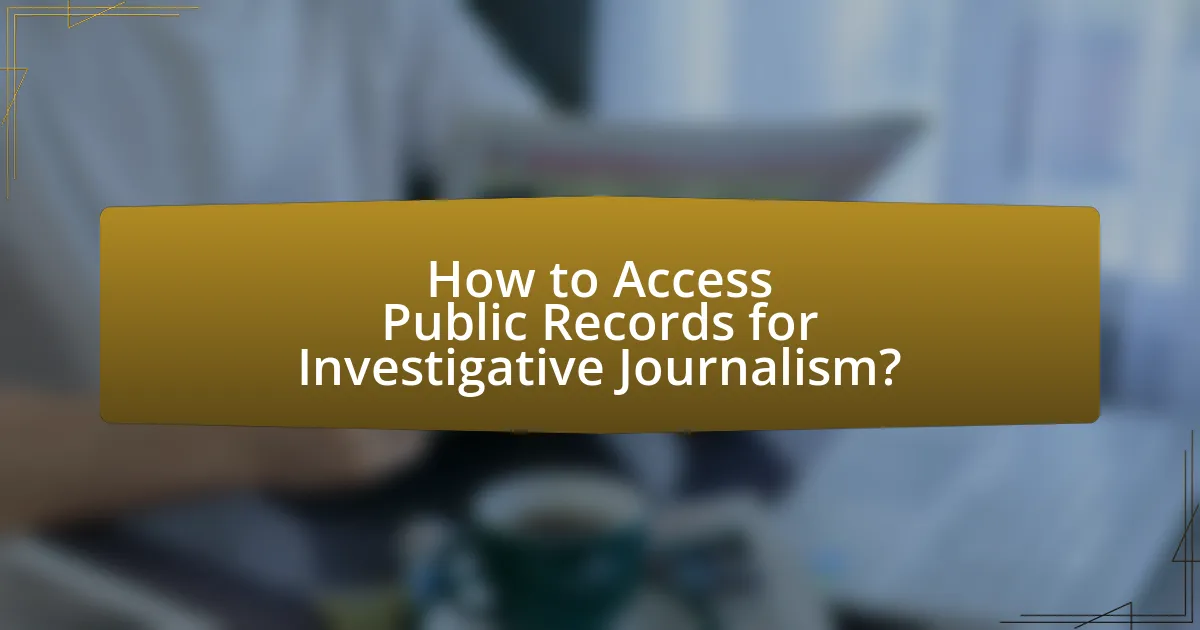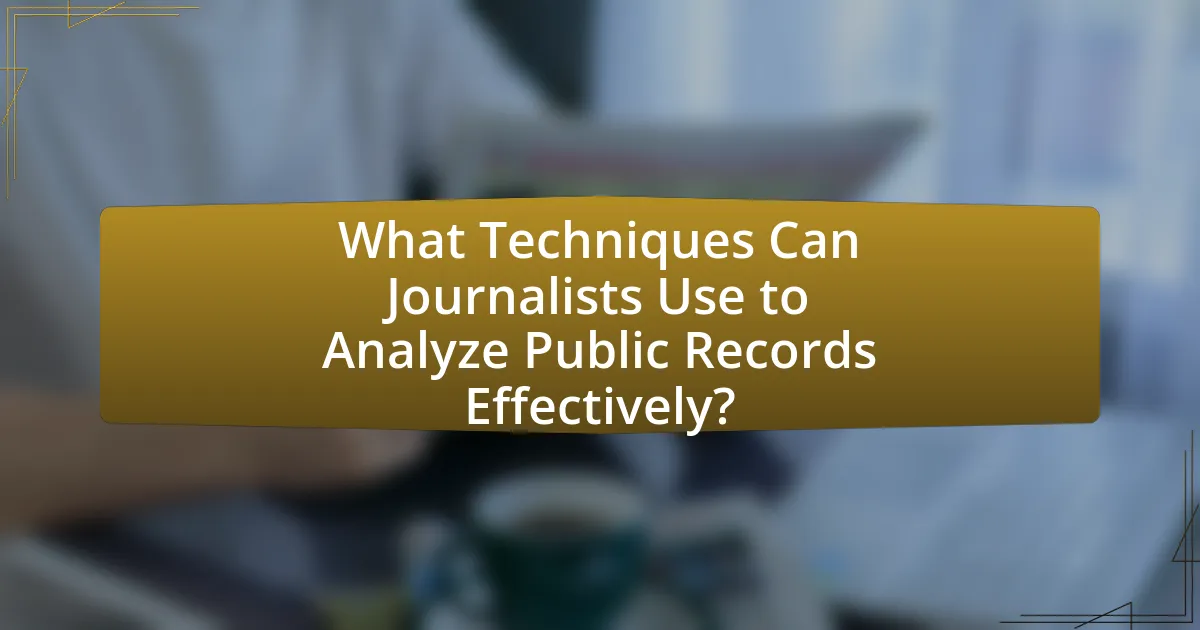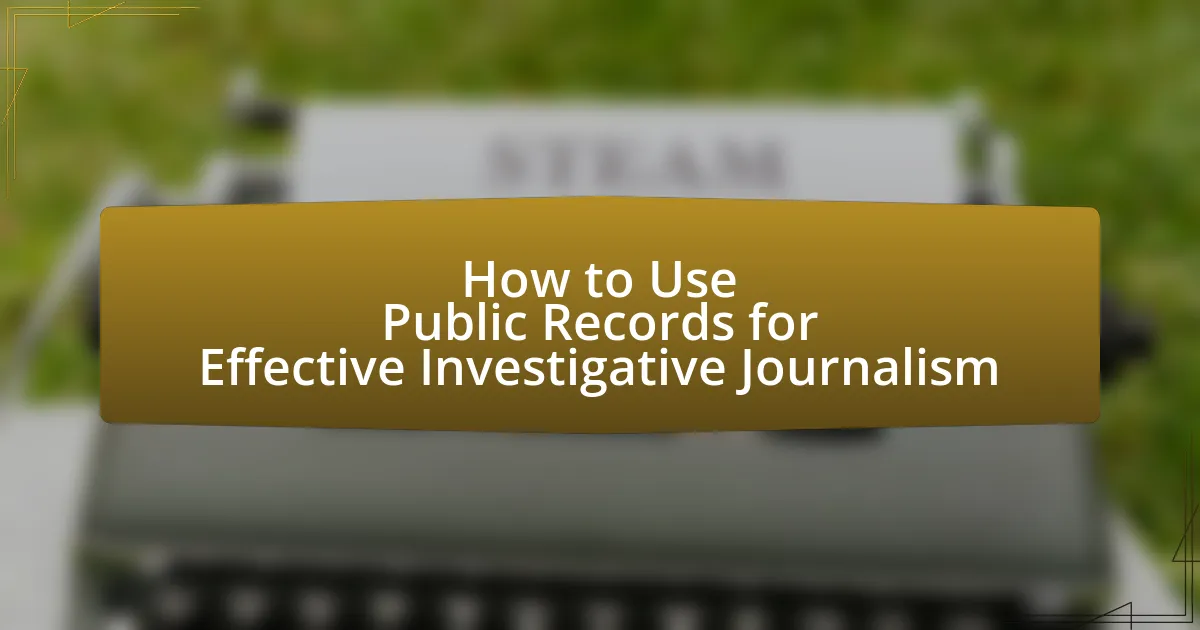Public records are essential documents maintained by government agencies that provide valuable information for investigative journalism. This article explores the significance of public records in uncovering corruption, ensuring transparency, and holding public officials accountable. It details the types of information available in public records, the legal considerations journalists must navigate, and the steps to access these records effectively. Additionally, the article discusses techniques for analyzing public records, the challenges journalists face, and best practices for maintaining ethical standards while utilizing this information for impactful reporting.

What are Public Records and Why are They Important for Investigative Journalism?
Public records are documents or pieces of information that are not considered confidential and are maintained by government agencies, including court records, property records, and vital records. They are important for investigative journalism because they provide journalists with access to verified information that can uncover corruption, hold public officials accountable, and inform the public about issues affecting their communities. For instance, a study by the Reporters Committee for Freedom of the Press highlights that public records have been instrumental in exposing government misconduct and ensuring transparency in various cases.
How can public records enhance the quality of investigative journalism?
Public records enhance the quality of investigative journalism by providing verifiable data that supports claims and uncovers hidden truths. These records, which include court documents, property records, and government reports, allow journalists to substantiate their findings with factual evidence. For instance, a study by the Pew Research Center found that 63% of journalists reported using public records to enhance their stories, demonstrating their critical role in revealing corruption or misconduct. By accessing these records, journalists can conduct thorough investigations, ensuring accountability and transparency in public affairs.
What types of information can be found in public records?
Public records contain various types of information, including property records, court records, vital records (such as birth and death certificates), marriage licenses, and business licenses. These records are maintained by government agencies and are accessible to the public, providing transparency and accountability. For example, property records can reveal ownership history and property tax assessments, while court records can provide insights into legal proceedings and outcomes. Vital records document significant life events, and business licenses can indicate the legitimacy of a business entity. This information is crucial for investigative journalism as it allows journalists to verify facts, uncover hidden relationships, and hold entities accountable.
How do public records contribute to transparency and accountability?
Public records enhance transparency and accountability by providing accessible information about government actions and decisions. These records, which include documents such as meeting minutes, financial reports, and legal filings, allow citizens to scrutinize the activities of public officials and institutions. For instance, the Freedom of Information Act (FOIA) in the United States mandates that federal agencies disclose records upon request, thereby promoting openness. Studies have shown that increased access to public records correlates with higher levels of public trust in government, as citizens can verify that officials are acting in the public interest.
What legal considerations should journalists be aware of when using public records?
Journalists must be aware of several legal considerations when using public records, including compliance with the Freedom of Information Act (FOIA), state-specific public records laws, and privacy concerns. FOIA mandates that federal agencies disclose records unless exempted, while many states have their own laws that may vary in terms of accessibility and exemptions. Additionally, journalists should consider the implications of using records that contain sensitive personal information, as misuse could lead to legal repercussions under privacy laws. Courts have upheld the right to access public records, but they have also ruled against the publication of certain information that could infringe on individual privacy rights, emphasizing the need for careful evaluation of the content being reported.
What laws govern access to public records?
Access to public records is primarily governed by the Freedom of Information Act (FOIA) at the federal level in the United States, which mandates that federal agencies disclose records upon request unless they fall under specific exemptions. Additionally, each state has its own public records laws, often referred to as “sunshine laws,” which outline the procedures and requirements for accessing state and local government records. These laws collectively ensure transparency and accountability in government operations, allowing journalists and the public to obtain information necessary for informed decision-making and investigative reporting.
How can journalists ensure compliance with privacy regulations?
Journalists can ensure compliance with privacy regulations by thoroughly understanding and adhering to laws such as the General Data Protection Regulation (GDPR) and the California Consumer Privacy Act (CCPA). These regulations mandate that journalists obtain consent before collecting personal data, provide transparency about data usage, and implement data protection measures. For instance, GDPR requires that individuals have the right to access their data and request its deletion, which journalists must respect when handling sensitive information. By following these legal frameworks, journalists can protect individuals’ privacy while conducting their investigative work.

How to Access Public Records for Investigative Journalism?
To access public records for investigative journalism, journalists should first identify the specific records they need, such as court documents, police reports, or government contracts. They can then utilize the Freedom of Information Act (FOIA) to request federal records or state-specific public records laws for state and local documents. According to the Reporters Committee for Freedom of the Press, nearly all states have laws that allow public access to government records, which can be requested through formal applications or online databases. Journalists should also familiarize themselves with the relevant agencies that hold the records and any associated fees or processing times.
What are the steps to request public records?
To request public records, follow these steps: identify the specific records needed, determine the appropriate agency or office that holds those records, and submit a formal request, often in writing, specifying the details of the records sought. Many jurisdictions have established procedures and forms available online to facilitate this process. For example, the Freedom of Information Act (FOIA) in the United States mandates that federal agencies respond to requests for records within 20 business days, ensuring transparency and access to public information.
How do you identify the right agency to contact for specific records?
To identify the right agency to contact for specific records, first determine the type of records needed, as different agencies manage different categories. For example, vital records such as birth and death certificates are typically held by state health departments, while property records are maintained by local county assessors or registrars. Researching the specific agency’s website can provide guidance on the records they manage and the process for requesting them. Additionally, consulting resources like the National Association of Secretaries of State can help identify the appropriate agency based on the record type and jurisdiction.
What information is typically required in a public records request?
A public records request typically requires the requester’s name, contact information, and a detailed description of the records sought. This information is essential for the agency to identify and locate the requested documents efficiently. Additionally, specifying the timeframe for the records can help narrow down the search, ensuring a more accurate response. Public agencies often have guidelines outlining these requirements, which can vary by jurisdiction, but the core elements remain consistent across most requests.
What tools and resources can assist in accessing public records?
Online databases and government websites are essential tools for accessing public records. These resources include platforms like the National Archives, state-specific public record databases, and local government websites that provide access to documents such as court records, property records, and vital statistics. For instance, the Freedom of Information Act (FOIA) allows individuals to request records from federal agencies, enhancing transparency. Additionally, commercial services like LexisNexis and Westlaw aggregate public records, making them searchable and accessible for investigative purposes. These tools collectively facilitate the retrieval of accurate and comprehensive public records necessary for effective investigative journalism.
Which online databases are most useful for journalists?
The most useful online databases for journalists include ProPublica, the National Security Archive, and the Federal Bureau of Investigation’s (FBI) Vault. ProPublica offers access to a wealth of investigative reports and data sets, which can aid in uncovering stories. The National Security Archive provides declassified documents and records that are essential for investigative journalism, particularly in matters of government transparency. The FBI’s Vault contains a vast array of documents related to criminal investigations and national security, allowing journalists to access primary sources for their reporting. These databases are critical tools for journalists seeking to conduct thorough and effective investigative work.
How can technology streamline the process of obtaining public records?
Technology can streamline the process of obtaining public records by enabling online access to databases and automated request systems. Digital platforms allow users to search and retrieve records quickly, reducing the time and effort required compared to traditional methods. For instance, many government agencies have implemented electronic filing systems that facilitate instant access to documents, which can significantly decrease processing times. According to a report by the National Association of Secretaries of State, 70% of states have adopted online portals for public records, enhancing transparency and efficiency in accessing information.

What Techniques Can Journalists Use to Analyze Public Records Effectively?
Journalists can effectively analyze public records by employing techniques such as data mining, cross-referencing, and utilizing software tools for analysis. Data mining allows journalists to extract relevant information from large datasets, while cross-referencing helps verify facts by comparing multiple sources. Additionally, software tools like spreadsheets and database management systems enable efficient organization and visualization of data, facilitating deeper insights. For instance, the use of tools like Microsoft Excel or Google Sheets can help journalists identify trends and anomalies in financial records or public spending data, enhancing their investigative reporting.
How can data analysis enhance the investigation process?
Data analysis enhances the investigation process by enabling the identification of patterns and correlations within large datasets. This capability allows investigators to uncover hidden relationships and trends that may not be immediately apparent through traditional methods. For instance, in a study by the Pew Research Center, data analysis techniques were shown to significantly improve the accuracy of investigative findings by revealing connections between public records, such as financial transactions and criminal histories, which can lead to more informed conclusions. By leveraging data analysis, journalists can efficiently sift through vast amounts of public records, leading to more thorough and impactful investigations.
What software tools are available for analyzing public records data?
Software tools available for analyzing public records data include Tableau, Microsoft Excel, and OpenRefine. Tableau allows users to visualize and analyze data through interactive dashboards, making it easier to identify trends and patterns in public records. Microsoft Excel provides robust data manipulation and analysis capabilities, enabling users to organize and analyze large datasets effectively. OpenRefine is a powerful tool for cleaning and transforming messy data, which is often the case with public records. These tools are widely used in investigative journalism to extract insights from complex datasets, enhancing the quality and depth of reporting.
How can journalists visualize data from public records for better storytelling?
Journalists can visualize data from public records by employing tools such as charts, graphs, and interactive maps to enhance storytelling. These visualizations help to distill complex information into easily digestible formats, making it accessible to a broader audience. For instance, using a heat map to display crime statistics can reveal patterns and trends that are not immediately apparent in raw data. Research shows that visual storytelling increases audience engagement and retention of information, as studies indicate that visuals are processed 60,000 times faster than text. By integrating these visual elements, journalists can effectively communicate their findings and provide context, thereby enriching their narratives and fostering a deeper understanding of the issues at hand.
What common challenges do journalists face when using public records?
Journalists commonly face challenges such as accessibility, complexity, and delays when using public records. Accessibility issues arise when records are not readily available or are difficult to obtain due to bureaucratic hurdles. Complexity refers to the often intricate nature of the records, which may require specialized knowledge to interpret correctly. Delays can occur when government agencies take extended periods to respond to requests, hindering timely reporting. These challenges can significantly impact the effectiveness of investigative journalism, as highlighted by the Reporters Committee for Freedom of the Press, which notes that navigating public records laws can be a daunting task for journalists.
How can journalists overcome obstacles in accessing records?
Journalists can overcome obstacles in accessing records by utilizing legal frameworks such as the Freedom of Information Act (FOIA) to request documents. FOIA mandates federal agencies to disclose information unless it falls under specific exemptions, thus providing a structured approach for journalists to obtain necessary records. Additionally, journalists can build relationships with public officials and agency staff to facilitate access, as personal connections often lead to more cooperative interactions. Research indicates that persistent follow-up and clarity in requests significantly increase the likelihood of successful record retrieval, as demonstrated by numerous investigative reports that highlight the effectiveness of strategic persistence in accessing public records.
What strategies can be employed to deal with incomplete or misleading information?
To deal with incomplete or misleading information, journalists should employ verification techniques, cross-referencing multiple sources, and utilizing fact-checking tools. Verification techniques involve confirming the authenticity of information through reliable sources, which helps to establish credibility. Cross-referencing multiple sources ensures that the information is consistent and corroborated, reducing the likelihood of relying on a single, potentially misleading source. Fact-checking tools, such as Snopes or PolitiFact, provide additional layers of scrutiny by assessing the accuracy of claims made in public records or statements. These strategies are essential in investigative journalism, as they enhance the reliability of the information presented to the public.
What best practices should journalists follow when using public records?
Journalists should follow several best practices when using public records to ensure accuracy and integrity in their reporting. First, they must verify the authenticity of the records by cross-referencing them with other reliable sources. This step is crucial as it helps to confirm the validity of the information obtained. Additionally, journalists should be aware of the legal frameworks governing public records, including access laws and restrictions, to avoid potential legal issues.
Furthermore, maintaining transparency with the audience about the sources of information enhances credibility. Journalists should also document their research process meticulously, noting how and where they obtained the records, which aids in accountability. Lastly, they should respect privacy concerns and ethical considerations, ensuring that the use of public records does not infringe on individuals’ rights or lead to unnecessary harm. These practices collectively contribute to responsible and effective investigative journalism.
How can journalists maintain ethical standards while utilizing public records?
Journalists can maintain ethical standards while utilizing public records by adhering to principles of transparency, accuracy, and respect for privacy. Transparency involves clearly disclosing the sources of information and the methods used to obtain public records, ensuring that the audience understands the context of the reporting. Accuracy requires journalists to verify the information obtained from public records against multiple sources to prevent misinformation. Respect for privacy means being mindful of sensitive information that could harm individuals, even if it is publicly accessible, and making ethical decisions about what to publish. For instance, the Society of Professional Journalists emphasizes the importance of minimizing harm and acting in the public interest, which guides journalists in their ethical considerations when using public records.
What tips can improve the effectiveness of public records investigations?
To improve the effectiveness of public records investigations, researchers should utilize a systematic approach that includes thorough preparation, targeted requests, and effective follow-up. Thorough preparation involves understanding the specific records needed and the relevant laws governing access to those records, such as the Freedom of Information Act, which mandates public access to government documents. Targeted requests should be clear and concise, specifying the exact documents sought to avoid delays and ensure compliance. Effective follow-up is crucial; investigators should maintain communication with the records custodians to address any issues or clarifications promptly. These strategies enhance the likelihood of obtaining the necessary information efficiently and accurately.

Leave a Reply